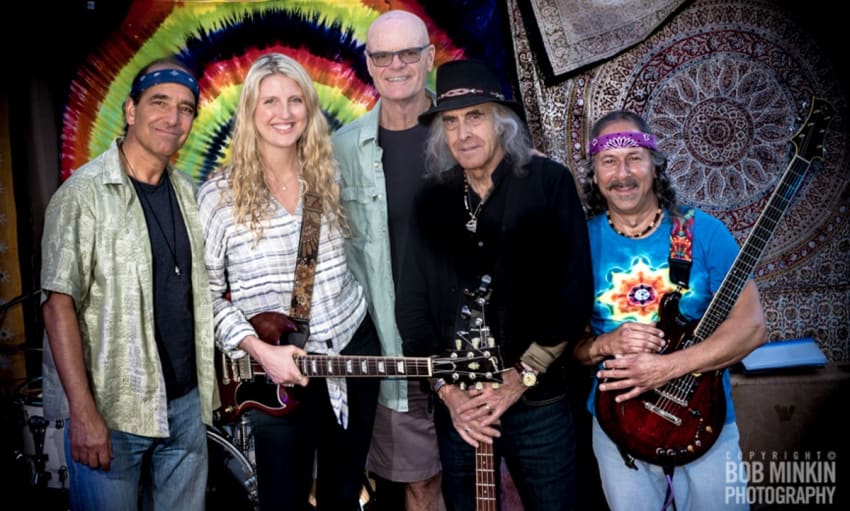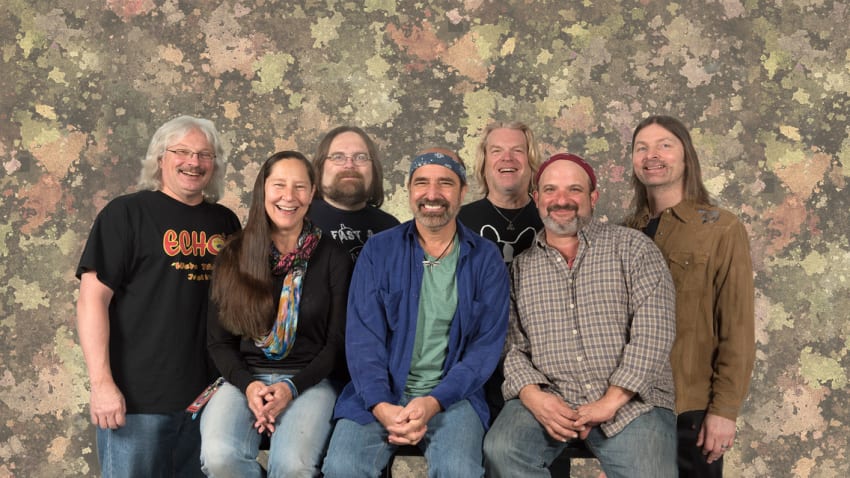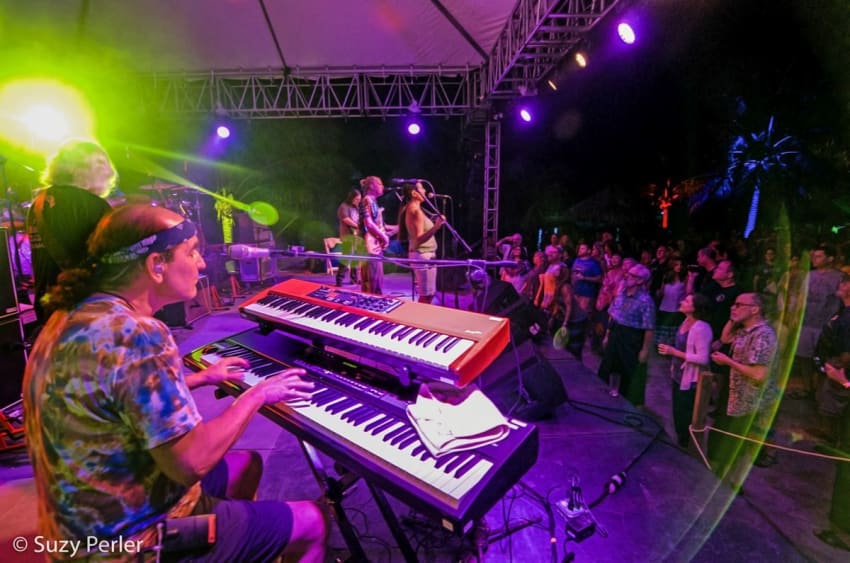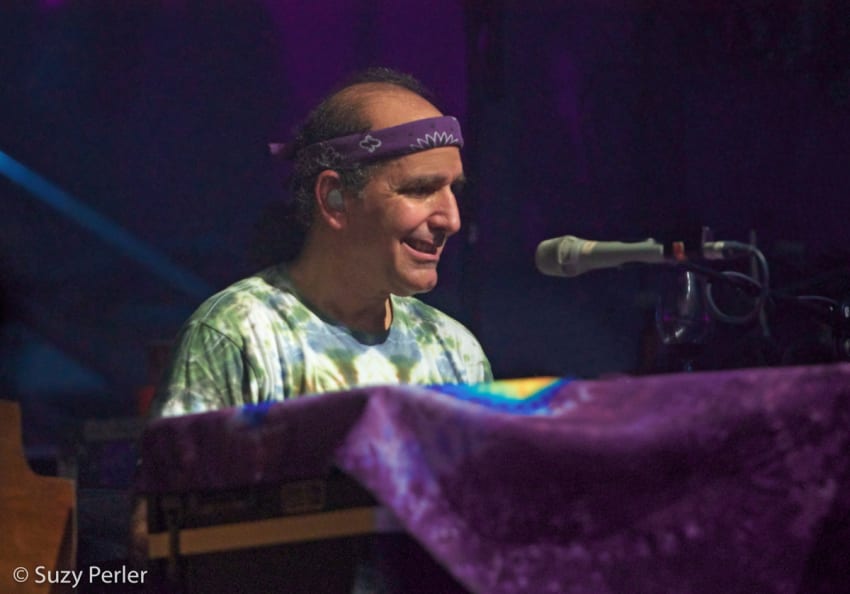Bringing The Dead To Life: Rob Barraco On Dark Star Orchestra, California Kind & More
By Chad Berndtson Nov 6, 2017 • 8:02 am PST
Welcome to another edition of The Art Of The Sit-In, where we mix it up with the scene’s most adventurous players and hear some stories from the road. For more, check out our recent interviews with Bruce Hornsby, Nels Cline, Eric Krasno, Todd Nance, John Popper, Andrew “Red” Johnson, Jimmy Herring and many more. (A full archive of more than 50 The Art Of The Sit-In features is here.)
This Saturday, November 11, marks 20 years of Dark Star Orchestra, which rose to the very top rank of Grateful Dead tribute bands by recreating shows from all over the 30-year history of the Dead, but, more importantly, being so adept at what they do that they earned the acclaim of the original Dead members and developed a widespread fanbase.
That they so effectively converse in the musical language of the Dead means DSO legitimately transcended the typical boundaries of a tribute band without quite escaping them — part of another golden age of Dead-focused bands that includes Joe Russo’s Almost Dead, Phil Lesh’s Terrapin Family Band and Dead & Company.
Playing no small part in this golden age is Rob Barraco, the multi-instrumentalist with the perma-smile and the emphatic vocals. It’s Barraco’s keys, or singing, or bass, or what-have-you, that you’ve heard everywhere from the Zen Tricksters to the beloved Phil Lesh Quintet from the early 2000s, and, since 2005, Dark Star Orchestra, into which Barraco moved — and never left — following the passing of DSO keys player Scott Larned.
We’re pleased to welcome Barraco back to The Art Of The Sit-In to fill us in about DSO’s 20th anniversary and his many other associations, including a new band, California Kind, that features the music of up-and-comer Katie Skene backed by a band of heayvweights: Barraco, John Molo, Barry Sless and Pete Sears. (California Kind closes a short tour Wednesday night at Terrapin Crossroads in San Rafael, California, before Dark Star’s anniversary tour resumes on Friday in Montclair, New Jersey.)
JAMBASE: So how are you?
ROB BARRACO: I’m doing great, we’re on our way to a few more shows with this new band I’m with, California Kind.
JAMBASE: How did this come together? It’s Katie [Skene] and you and a few folks who are obviously well known to our scene.
RB: John Molo, you know, he met Katie down in L.A. He was producing a young band and they are friends with her, and he heard her music and just flipped. They started talking, and he got an idea, and he talked to Barry Sless about it and looked at whether they could put together a band with her. Barry called me late last year and said, “I have this great band idea and I think you and her would sound so good together vocally.” She’s a shredder! She plays guitar like nobody’s business. So I took a chance and came out to California and rehearsed and did two gigs, and by the end of the second gig, I felt like it definitely had mojo. It’s been huge fun. I’ve been part of a lot of bands over the years, and there are only a few of them that had real mojo. Dark Star is one of those, the Phil Lesh & Friends group — the Q — was another. This band has mojo.

Photo by Bob Minkin
JAMBASE: How are you finding time for this? You’re not exactly not busy.
RB: I’m spending time on it, man. They’re totally cool about working around my schedule with Dark Star. I have no intention not to do Dark Star, and I don’t mind spending my off time doing this. It’s what I signed up for when I chose to be a working musician.
JAMBASE: We’re coming up this week on the 20th anniversary of Dark Star Orchestra. How does that make you feel having been part of this for more than half its existence?
RB: I’m really proud of Dark Star. When I first joined the band, in 2005, it was after Scott Larned had passed away and I felt I had really big shoes to fill. I had come from playing with Phil and had a different take on Grateful Dead music from that, but I instantly got what Dark Star was trying to do, which is keep in the spirit of the Dead but also do complete improvisation within that.
Over only a little bit of time, I realized I had a lot of homework to do. I was of course a Dead fan but I honestly kind of missed out on the Brent [Mydland] era. I saw my first show in ’72, and by ’78 I was kind of done — I had become a jazz snob and that’s really all I wanted to go see at that time. Jeff Mattson, when he got me to join the Zen Tricksters, that’s kind of how I got back into it. I had never really listened to the Brent thing too much, and the Dark Star guys told me, you’re going to have to delve into the Brent catalog.
So, I learned that Brent’s era — Brent’s singing — was tremendous. He had the coolest voice. And having to emulate that has honestly made me such a better singer, in part because having to sing all those high harmonies was so out of my wheelhouse. It forced me to pay more attention and be versatile.

JAMBASE: And you’ve taken on a lot of the Pigpen vocal parts too.
RB: Oh yeah. The funny thing is, before Jeff joined the band, we really didn’t recreate shows before 1972. For whatever reason, with John Kadlecik, they focused after ’72 and that was John’s wheelhouse. Jeff came on, and I’ve known Jeff for 30-plus years, and I knew what his wheelhouse is, and it’s the psychedelic Dead era. We figured out quickly that we had to do shit from ’69, ’70 and ’71, and that was beautiful for me, because I’m a huge Pigpen freak. The first time I saw the Dead I saw Pigpen — it was the only time I got to see Pigpen. I’ve always been enamored of his whole freestyle rap thing on tunes like “Lovelight.” It’s such a hoot to try to recreate that.
JAMBASE: Are there any eras of Dead music that Dark Star Orchestra really won’t touch?
RB: Not at this point, though we have shied away from the really later Dead stuff, like ’93, ’94 and ’95, because there’s a lot of music in there that just doesn’t really resonate for us. At some point I think we’re going to have to, and there are still some Brent-era shows that we just need to get our arms around.
I think we will eventually do everything. Our big ones are the early ’90s era, and the obvious ’70s eras, especially ’76, ’77 and ’78. But having been able to delve back into ’69 has really opened it up more. I think on this next tour we will be doing a ’68 show. It can be hard because a lot of those early shows from the ’60s are early/late shows that repeat a lot of songs. So one of the ideas we have is to take, say, two ’68 shows and just do those as different sets, or play the set from the day we’ve chosen in ’68 and then play an elective set in the ’68 style. I love that stuff.
JAMBASE: The long, winding “Violas” and stuff from that era — you guys seem to really dig in there.
RB: Oh man, we do “Viola” in elective sets, and that’s one of the most exciting things we do.
JAMBASE: I remember the Q used to take that pretty deep, too. You guys took a lot deep.
RB: Yeah, yeah. The Q, man, that was a force of nature. That was the first band I was in where, maybe 30 minutes into the very first rehearsal, we all knew we had struck gold. We hit the road, and it was like every show was just melting. That was a very special time in life. I really dug Phil’s thing about being the first among equals. He didn’t want people to take designated solos, he wanted people to play and to see what happened with it. Phil was always the guy for me, you know? His whole way of looking at rhythm and playing in odd time signatures was everything for me — it was formative. It’s always been an honor for me to play with him.
JAMBASE: You just came off a few dates with The Terrapin Family Band. You’ve stayed in the Phil orbit, more or less, so is it safe to say you will play more with Phil?
RB: Who knows, you know? I do think he is very happy with the Family Band. We will see what we can do.
JAMBASE: I know in your recent Reddit AMA you talked a little about John Mayer, and Dead & Company, and of course we have other bands like Joe Russo’s Almost Dead helping contribute to a really healthy ecosystem of Grateful Dead bands.
RB: Yeah, I mean Grateful Dead culture is so pervasive. It’s not going away. It keeps bringing up a new audience, and that’s what will perpetuate this thing over the long term. Dark Star has our thing. JRAD has their thing, and what they do is great. And then you still have the founders doing their thing, with Bobby, Mickey and Billy doing that, and Phil doing what he wants. The more bands that do this well – that’s what keeps people coming into this culture.
JAMBASE: Jumping back to Dark Star Orchestra, how do you guys balance the re-creating of shows vs. elective setlists? Who makes those calls?
RB: Rob [Eaton] sits down and puts it together. He’ll usually start with the city, say, Albany. He’ll look at Albany and he’ll see what we’ve played the last four times we’ve been in town, and based on that we’ll try to pick something different. So maybe last time Albany was an ’82 show, and he’ll start looking forward or backward. Then, using a possible setlist, he’ll look at what’s happening in each town around that date. It’s inevitable that we’ll repeat a song here and there, but we want to keep it interesting, because we know Dark Star also has people on the road with us who are going to a lot of shows, and some people, even every show.
Based on the possibilities, every third or fourth show we’ll probably opt to do an elective setlist. Those are really fun, because not only are we picking the songs, but we can have a Pigpen tune and a Brent tune in the same show. Sometimes we’ll even go as far as setting up on stage and mixing eras and instruments from different historical periods in the band. One set we could do a ’69 sounding thing, and then the next set do an ’80s sounding thing.
JAMBASE: And speaking of variability, you played a few shows recently without Rob. Losing any of you is obviously going to affect the sound, but it seems like you take the opportunity to do something unusual in a circumstance like that.
RB: Yes, that’s how it works. Rob had a family issue to deal with, and we were like, hmm, what can we do here? And we decided to do Garcia band shows: a ’78 Garcia band show, and then an ’89 Garcia band show, which are two completely different animals. It was huge fun, and of course we all need Rob to be there, but if it has to be a circumstance where he or any one of us can’t be there, we will do what we need to do.
Our road manager, Tanya [Shylock] is also an amazing singer, and with Lisa [Mackey] we were able to put together the Donna Godchaux/Maria Muldaur era, and then the Jackie/Gloria era. The audience ate it up. We were worried people wouldn’t like it, but they were totally into it.
JAMBASE: With regard to other possibilities, you and Jeff continue to play together in side bands. I remember a few years back you were going to do something more with Nicky from the Steep Canyon Rangers — whatever happened to that?
RB: We don’t have anything in mind with Nicky. He’s great, he’s just too busy. We’ve been around with that band with a bunch of lineups and what we’ve settled into is a focus on Jeff’s tunes. My son Tom is the drummer in that band, Lisa is our singer, and Skip is the bass player, and we just really love this lineup. It’s got the mojo. Jeff, you know, his influences are so vast. I hear these things in his playing with Dark Star because I’ve known him for so long, but in this band he can really stretch out and you hear the influences beyond the Garcia stuff, like Hendrix and Richard Thompson. Jeff is a Richard Thompson freak. He’ll do stuff, and then he’ll randomly play certain solos, though, and it’ll sound like pedal steel licks and you think it’s Buddy Cage or something. This is another way we can be really creative.
JAMBASE: At one point, you guys in Dark Star were talking about inserting more original music, and even “opening” for yourselves as Dark Star Orchestra by playing originals.
RB: We still talk about that, definitely. It’s very difficult, because to do an originals thing you have to rehearse, you have to go into the studio and record, and our time is limited. I have the ability to get out there, but we’re all over the country, all of us, and our drummers especially have young kids at home.
That said, I think over the next few years you’ll start to see more of that. We do have that tune “Run Mary” that we wrote with [Robert] Hunter and we do insert that once in a while, particularly in the filler sections at the end of our shows. I can definitely see doing more of it. Rob Eaton has a bunch of tunes, I have some tunes, Jeff has a lot of tunes, even Dino has some tunes. Some of them would make sense for us.
JAMBASE: Will you guys be doing anything special during the actual 20th anniversary show this Saturday in Albany?
RB: Yeah, I think so. We have a few things happening. I’ve been a little out of the loop on the planning, but I know there will be some extra special lighting, some video projection, stuff like that. The setlist as far as I know is TBD.
JAMBASE: Do you stay in touch with the Dark Star alumni, like John Kadlecik and Kevin Rosen?
RB: Not so much John — I don’t get the opportunity to speak to him much. Kevin, yes. I think all of us will call him up every now and then, and every time we’re in Chicago he usually comes to play with us. It’s always great to see him. He’s a really cool guy, and it was sad he had to leave the road, but there’s a time and place for everything.
JAMBASE: Rob, it’s great to catch up as always. Can I get you to share a recent sit-in story, you with another band or someone with one of your bands?
RB: Well, it’s not recent, but it is pretty good. Back when I was playing with the Q, Warren was of course also in The Allman Brothers. One time, when we were on a break and it was March, he called me up and said, “What are you doing tonight you want to come sit-in with us at the Beacon?” And I’ve sat in a few times of course but this was early on and I thought how cool, I get to go to the Beacon and play with The Allman Brothers. They announce my name, and I come up on stage, and I have to share Gregg’s organ bench. I sit down and I tell him “Man, this is an honor and a thrill,” and he’s smiling and says “It’s going to be really cool.”
The song we did was “Statesboro Blues,” and wow, literally six inches from me is Gregg Allman singing, “Wake up, ma-ma…” You know me — I’m an animated player! [laughs] I move around. I’m just beaming and glowing the whole time and I play and it’s great, and then later I get this tap on the shoulder. Gregg goes, “Hey man, that was really good, except one thing. This bench we’re sitting on, it’s really old, and it’s really meaningful to me, and I would be extremely upset if anything were to happen to it.” So every other time I sat-in with the Allmans, and next to Gregg, I was almost frozen. [laughs] Like, don’t move, just use your hands!
I think about that almost every day, and especially this year with Gregg’s passing. It’s very meaningful to me.
Loading tour dates



